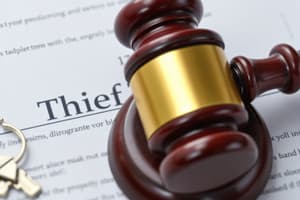Podcast
Questions and Answers
What is the definition of theft?
What is the definition of theft?
A person commits an offense if he unlawfully appropriates property with intent to deprive the owner of property.
What is the definition of theft of services?
What is the definition of theft of services?
A person commits an offense if he has the intent to avoid payment for services that the actor knows are provided only for compensation.
What is considered unauthorized use of a vehicle?
What is considered unauthorized use of a vehicle?
A person commits an offense if he intentionally or knowingly operates another's boat, airplane, or motor-propelled vehicle without the effective consent of the owner.
What is effective consent?
What is effective consent?
What does it mean to deprive the owner of property?
What does it mean to deprive the owner of property?
What is the theft charge classification for property stolen with a value less than $100?
What is the theft charge classification for property stolen with a value less than $100?
What is the theft charge classification for property stolen valued at $100 or more but less than $750?
What is the theft charge classification for property stolen valued at $100 or more but less than $750?
What is the theft charge classification for property stolen valued at $750 or more but less than $2500?
What is the theft charge classification for property stolen valued at $750 or more but less than $2500?
What constitutes a State Felony charge for theft?
What constitutes a State Felony charge for theft?
What is the classification for a theft charge if the property stolen is valued at $30,000 or more?
What is the classification for a theft charge if the property stolen is valued at $30,000 or more?
What is the classification for a theft charge if the value of the property stolen is $150,000 or more but less than $300,000?
What is the classification for a theft charge if the value of the property stolen is $150,000 or more but less than $300,000?
Study Notes
Theft Overview
- Theft occurs when an individual unlawfully appropriates property with the intent to deprive the owner of it.
- Definition of theft, according to Texas Penal Code, is found in Sec. 31.01.
Theft of Services
- A person commits theft of services by intending to avoid payment for services that are rendered solely for compensation (Sec. 31.04).
Unauthorized Use of a Vehicle
- Operating another person’s boat, airplane, or motor-propelled vehicle without effective consent is classified as unauthorized use of a vehicle (Sec. 31.07).
Effective Consent
- Consent must be provided by someone legally authorized to act on behalf of the owner to be considered effective.
Definition of Deprivation
- Deprivation is defined as withholding property from the owner for an extended time, resulting in loss of value or enjoyment.
Misdemeanor Classes
- Class C Misdemeanor: Theft where the property value is less than $100.
- Class B Misdemeanor: Theft where the property value ranges from $100 to less than $750.
- Class A Misdemeanor: Theft where the property value ranges from $750 to less than $2500.
- Class B Misdemeanor also applies if the property stolen is a driver’s license or personal identification certificate.
State Felony Charges
- State Felony: Theft value from $2500 to less than $30,000, or when less than 10 head of livestock are stolen.
- Theft from a human corpse or grave, or if the stolen property is a firearm, is classified as a State Felony regardless of value.
- Previous convictions impact theft classification, such that a value less than $2500 with two previous theft convictions results in a State Felony charge.
Election-Related Theft
- Theft of official ballots or election carrier envelopes is a State Felony charge.
Specific Theft Circumstances
- Theft of metals like aluminum, bronze, copper, or brass valued under $20,000 can incur a State Felony charge.
- Theft of a catalytic converter with replacement cost under $30,000 also results in a State Felony charge.
Increased Felony Classifications
- Third Degree Felony: Theft valued between $30,000 and $150,000.
- Second Degree Felony: Theft of property valued between $150,000 and $300,000.
- First Degree Felony: Theft valued at $300,000 or more or if the actor was a public servant during the offense.
Protection of Vulnerable Groups
- Theft from elderly individuals or nonprofit organizations leads to a First Degree Felony charge.
Medicare Provider and Government Relations
- First Degree Felony applies if a theft involved a Medicare provider acting under a governmental contract.
Aggravated Theft Circumstances
- Causing fire alarms to activate or using devices to prevent detection during the theft can escalate charges to First Degree Felony.
- Possessing a firearm while committing theft of a catalytic converter is classified as a First Degree Felony.
Studying That Suits You
Use AI to generate personalized quizzes and flashcards to suit your learning preferences.
Description
Test your knowledge on Chapter 31 of the Penal Code, focusing on theft offenses. This quiz includes key terms and definitions to help you understand the legal implications of theft and related crimes. Perfect for law students or anyone interested in criminal law.





